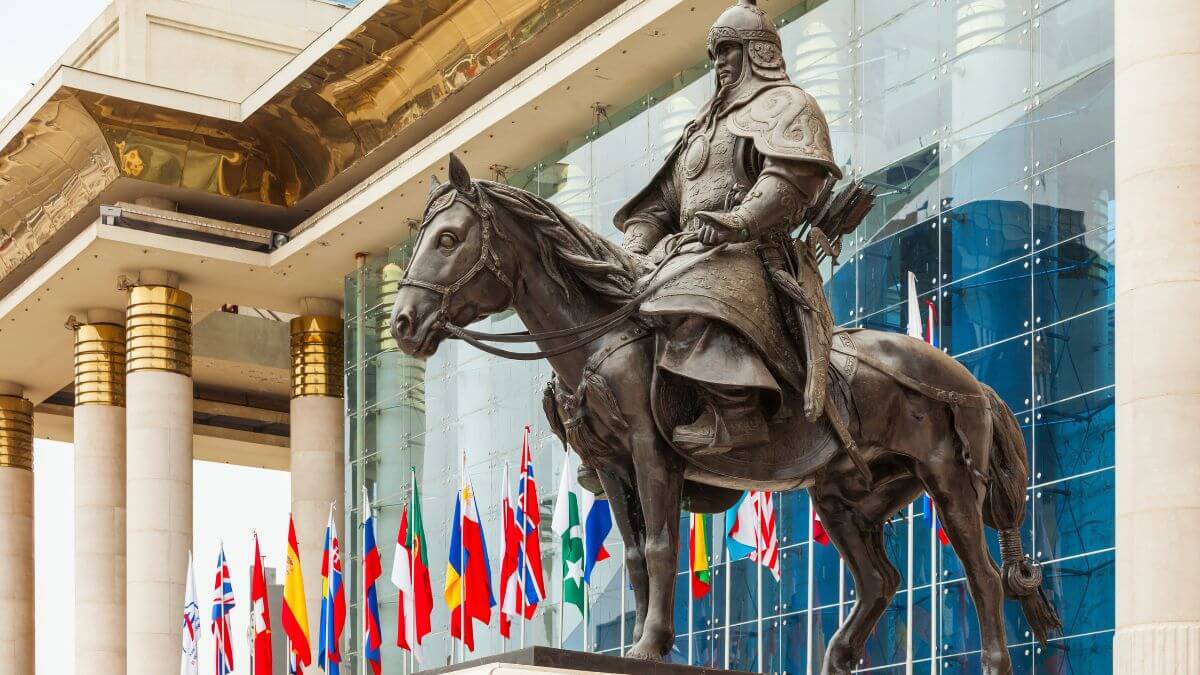Unorthodox, mind-boggling leadership techniques and management strategies have always set apart the greatest leaders in history.
And guess who remains a shining star among them?
Genghis Khan - the legendary founder of the Mongol Empire, which happens to be the most massive continuous empire ever seen.
Brace yourself for an electrifying journey as we delve into the astonishing strategies of this enigmatic conqueror.
Who was Genghis Khan?
Born around 1162, Genghis Khan, whose real name was Temujin (meaning "of iron" or "blacksmith"), grew up in the nomadic society of the Eurasian steppe. This sprawling grassland stretched from Eastern Europe to Central Asia, where our hero embarked on a truly extraordinary journey.
Genghis Khan skillfully united the diverse Mongol tribes, assembling a formidable military force that paved the way for conquering vast territories such as China, Central Asia, and even parts of Eastern Europe. The speed, strategic brilliance, and relentless tactics he employed marked a military revolution of its time.
The Khan's reign brought stability and economic prosperity to his empire as he promoted trade and communication along the legendary Silk Road. Yes, the very same network of ancient trade routes linking the East and the West.
Strategy No 1: Celebrating Diversity as the Ultimate Competitive Edge
Breaking the mould of traditional empire builders, Genghis Khan embraced the diversity of the territories he conquered. He enacted laws that guaranteed religious freedom to all and even granted tax exemptions to places of worship.
Talk about tolerance! This unique approach not only ensured the loyalty of his subjects but also turned diversity into a catalyst for his success. The Khan saw opportunities where others faced challenges.
Strategy No 2: The Meritocracy Mantra
The Great Khan had an uncanny knack for spotting talent. He established a merit-based system where promotions and positions of authority were earned through performance, not birthright or social status.
Let's take a thrilling example: During a battle in 1201 against the rival Taijut tribe, Genghis Khan's horse was shot out from under him by an arrow. After he won the battle, one brave soldier admitted to being the shooter.
Stirred by the soldier's audacity, the Khan made him an officer in his army and earned him the nickname "Jebe" or "arrow." This bold approach motivated his soldiers to show loyalty, give their absolute best, knowing that their efforts would be acknowledged and rewarded.
Strategy No 3: Unleashing Unconventional Communication Methods
Why settle for ordinary when you can be extraordinary? Genghis Khan defied societal norms and developed distinctive communication methods.
Recognising the importance of fast and efficient information exchange, he established an advanced Pony Express-like courier system called the "Yam."
This international postal network was composed of well-organised post houses and way-stations spanning his entire empire. By relaying messages through official riders who constantly switched horses every 20 miles, information could travel at unprecedented speeds.
The Yam also served as the Khan's eyes and ears, providing crucial updates on military and political developments while maintaining an extensive network of spies and scouts.
With timely, accurate information in his possession, Genghis Khan kept his empire united and made informed decisions.
Strategy No 4: Cultivating the Thirst for Knowledge
Genghis Khan's insatiable thirst for knowledge played a major role in his strategic brilliance. He surrounded himself with scholars, scientists, and creative thinkers, fostering a culture of continuous learning within his empire.
Truly, a leader who values intellectual growth paves the way for greatness.
Strategy No 5: Mastering Local Intricacies
Genghis Khan grasped the importance of understanding his enemies and forging alliances with diverse cultures. He enlisted local administrators who possessed a deep understanding of their respective regions.
This allowed him to integrate conquered peoples into his empire while embracing their unique identities. By assembling a workforce with varied backgrounds and perspectives, Genghis Khan tapped into an invaluable pool of ideas, creating an environment ripe for growth.
If Genghis Khan were a CEO today, he would effortlessly navigate multicultural markets and workforces.
Strategy No 6: Leading from the Frontlines
Genghis Khan set the bar high when it came to leading by example and did not hesitate to "get his hands dirty".
Fearlessly charging into battle and displaying unwavering bravery, he inspired his troops with his unmatched courage and tenacity.
CEOs, being actively involved in projects and showcasing an unyielding work ethic can inspire your teams to reach new heights. A contemporary pioneer, Elon Musk, CEO of Tesla and SpaceX, appears to have drawn inspiration from Khan's audacious visions and calculated risks.
Those daring moves have helped Musk's companies disrupt industries and redefine boundaries.
Strategy No 7: Adaptability and the Art of Situational Leadership
Adaptability was Genghis Khan's secret weapon. He understood that situational leadership was vital in a rapidly changing world. Whether it meant adapting military tactics to diverse terrains or adjusting governance policies to suit local cultures, the Khan remained one step ahead of his rivals.
In today's volatile business landscape, CEOs who can pivot swiftly and adapt to shifting market conditions are the ones destined for long-term success.
Genghis Khan's legacy shows us that leadership knows no bounds and is not confined to a specific time or place.
Ready to rise to the challenge and embark on our own conquests?
The path to extraordinary leadership begins now.




